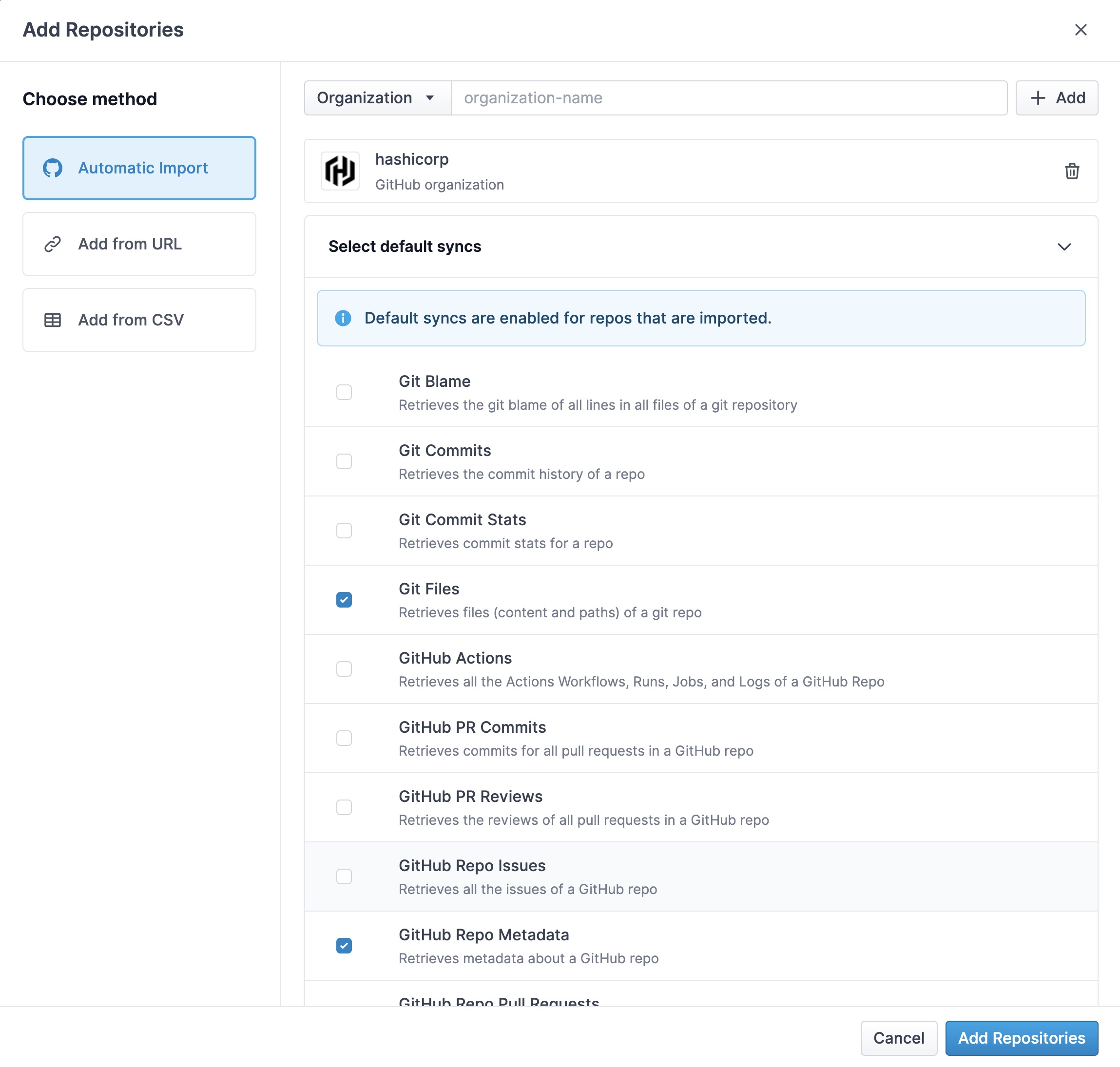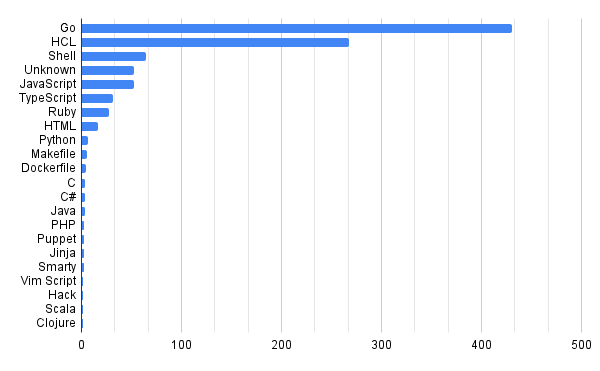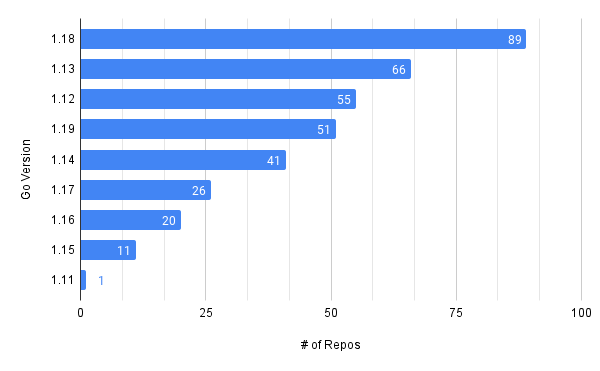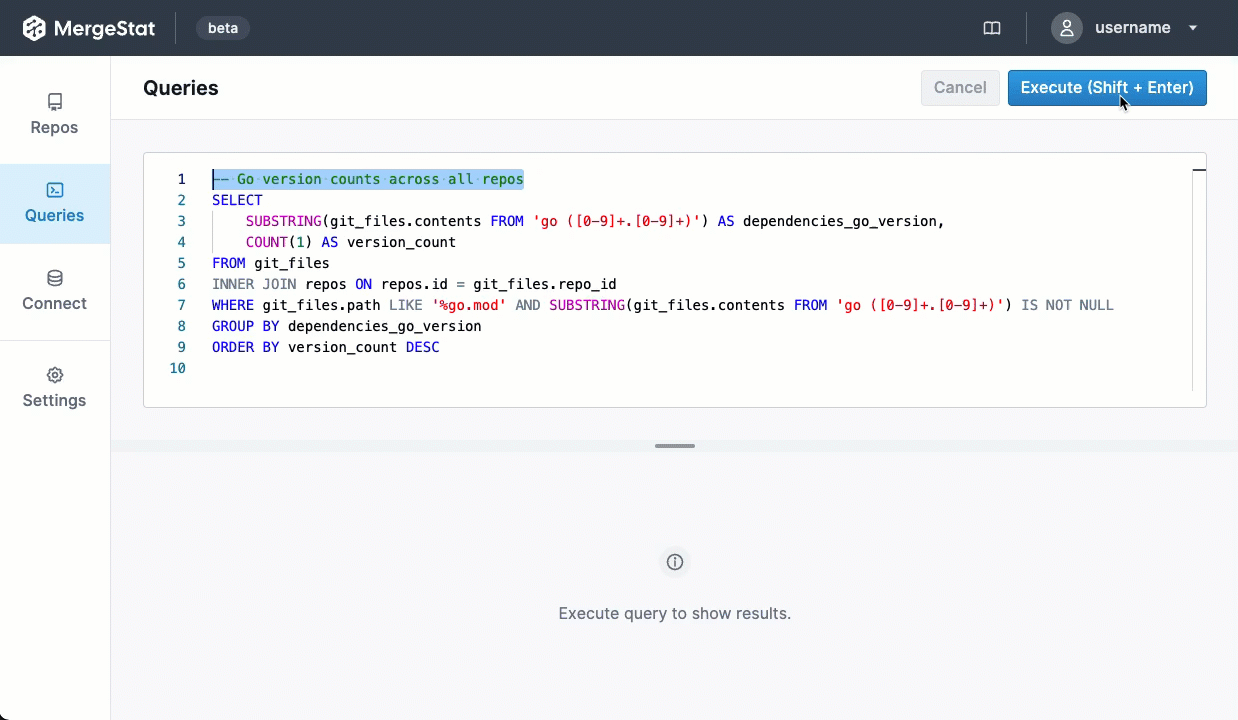The GIF on our landing page shows a SQL query executing in a MergeStat application:
If you look closely, you'll notice that the query has something to do with go.mod files.
In particular, it's this query:
-- Go version counts across all repos
SELECT
SUBSTRING(git_files.contents FROM 'go ([0-9]+.[0-9]+)') AS dependencies_go_version,
COUNT(1) AS version_count
FROM git_files
INNER JOIN repos ON repos.id = git_files.repo_id
WHERE git_files.path LIKE '%go.mod' AND SUBSTRING(git_files.contents FROM 'go ([0-9]+.[0-9]+)') IS NOT NULL
GROUP BY dependencies_go_version
ORDER BY version_count DESC
which parses out the go directive in any go.mod file it finds, looking for the declared Go version.
A go directive indicates that a module was written assuming the semantics of a given version of Go. The version must be a valid Go release version: a positive integer followed by a dot and a non-negative integer (for example, 1.9, 1.14).
Why?
Cool - but how is this useful? The value we are trying to convey in this query is MergeStat's ability to surface data across many Git repositories. This in particular should resonate with anyone who's worked on a team responsible for lots of codebases across an organization: DevEx, DevSecOps, Platform, etc.
Aggregating Go versions across many repos is useful in ensuring a consistent experience for Go developers. This may be important for an internal DevEx or Platform team to understand, or for any one responsible for the maintenance of many open-source, public Go projects.
It could serve as a proxy measure for how "up to date" codebases are, whether they are able to support the latest features of the language.
For instance, Generics were introduced in 1.18, and it may be important to know how much of your Go source code is able to make use of them by looking at go.mod files.
Looking at Public HashiCorp go.mod Files
Let's take a look at the go.mod files in some public Git repos.
HashiCorp is famously a large Go shop, and many of their core projects are in Go - so let's take a look at all their public repos!
Here's how I used MergeStat to do so:
Run MergeStat
First, I grabbed a server from our friends at Equinix Metal.
I intend to use the MergeStat docker-compose set-up, outlined here.
I ssh into my new server and run the following:
git clone https://github.com/mergestat/mergestat
cd mergestat
docker-compose up
This brings up an instance of MergeStat on port :3300 on the IP of my new server, where I can login with the default credentials postgres and password.
Setup Repos & Syncs
Next, I add a GitHub PAT so that I can:
- Add a repo auto import for the
hashicorpGitHub organization - Use the
GITHUB_REPO_METADATAsync type (theGIT_FILESsync does not require GitHub authentication, since it uses the native Git protocol)

I make sure to enable the GitHub Repo Metadata and Git Files sync types.

Now, the file contents and metadata from the GitHub API should begin syncing for all public HashiCorp repos 🎉. I can run this query to keep track of the initial sync:
SELECT count(*) FROM mergestat.repo_syncs WHERE last_completed_repo_sync_queue_id IS NULL
Once the result is 0, I'll know that the first run for all the syncs I've defined are complete.
Executing Queries
Once the initial data sync is complete, I can start executing some queries. Let's start by identifying how many of the 977 repos are identified as Go repos (by GitHub):
SELECT count(*), primary_language FROM github_repo_info
GROUP BY primary_language
ORDER BY count(*) DESC

Looks like 431 are picked up as Go codebases.
Next, let's run the original query from above, but with a small amendment.
I'll change the LIKE '%go.mod' to LIKE 'go.mod', to only identify go.mod files in the root of a repo.
This avoids picking up vendored Go modules.

And there you have it!
Looks like most public HashiCorp repos are on 1.18.
You may notice that the sum of all repos in this query is 390, not 431.
This is likely because not all Go repos have a go.mod file.
Operationalize It
Because MergeStat makes use of PostgreSQL, queries like this can be hooked up to BI tools and internal dashboards. This could be a useful way to track a migration effort, for instance, or alert on when a repo begins using a "non-standard" version of Go for your organization.
Further, these queries data can be augmented with commit and team data, to add additional dimensions.
Our community Slack is a great place to find help and ask questions. We're always happy to chat about MergeStat there 🎉!

